L.A. animal shelters brace for influx of pets as people face financial hardships from coronavirus
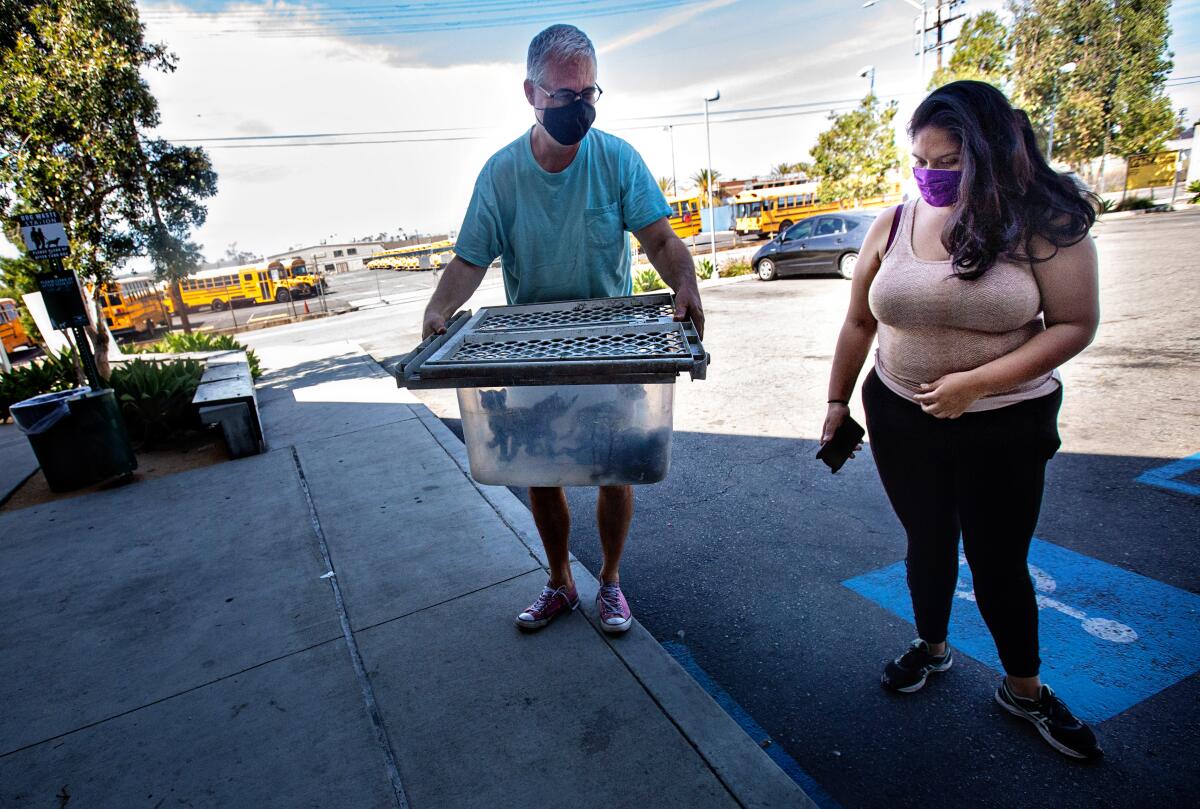
- Share via
When Los Angeles resident Paulina Valdivia scrolls through Snapchat and Instagram, she sees both heartwarming and troublesome posts about dogs and cats.
“There’s a lot of people looking for pets or wanting to ditch their pets,” said Valdivia, who was dropping off stray kittens she’d found in her yard at the city’s Chesterfield Square animal shelter Thursday.
Fosters of shelter animals are way up, both in Los Angeles and nationwide, as people seek out companions to ease the isolation of the coronavirus outbreak.
At the same time, Los Angeles city officials are bracing for an influx of pets being dropped off at city animal shelters, predicting that people facing financial hardship after losing jobs or homes will have to surrender their animals.
That influx hasn’t happened yet, but Los Angeles Department of Animal Services general manager Brenda Barnette is warning that she expects to see more pets given up in the coming year than during the Great Recession.
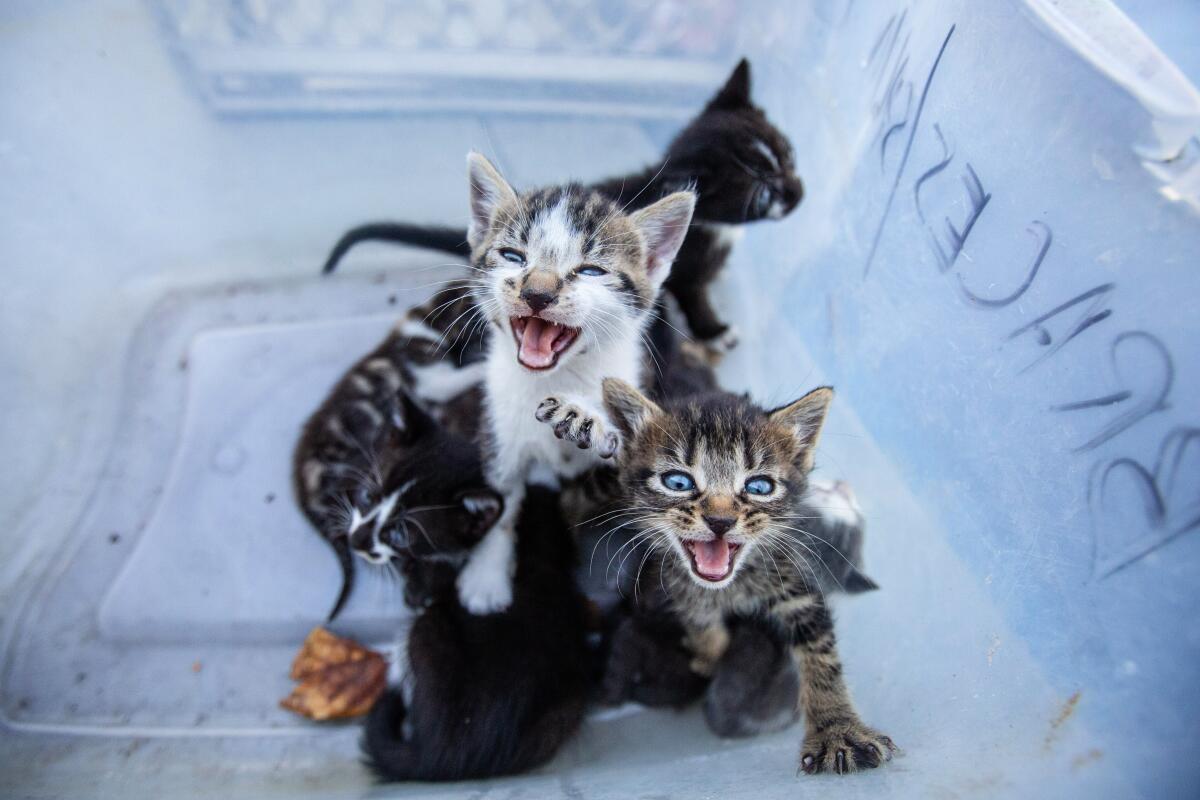
“If you want to know what keeps me up at night, it’s wondering how we’re going to accommodate all those animals who have been family members, as people start to have to surrender them,” Barnette said in an interview.
Sign up for our free Coronavirus Today newsletter
We’ll bring you the latest news, our best stories and what they mean for you — plus answer your burning COVID-19 questions.
The pandemic threatens to roll back progress at the city’s Animal Services Department, which has brought down the euthanasia rates of its shelter animals over the last decade. In 2012, about 18,000 cats and dogs were euthanized. By 2016, the number had dropped to 3,236, an 82% reduction. Last year, 4,886 cats and dogs were euthanized at city shelters, according to city data.
Concerned about a surge at shelters, the department is now asking people who call in to report a loose dog, for instance, to try to find the owner themselves or to foster the animal, if appropriate.
“We do not want to go back to the days that the shelter is so crowded that we’re having to kill animals because of lack of space,” Barnette said. “And so there’s a lot of ways to do that. One is to have aggressive adoption programs; one is to have big foster programs.”
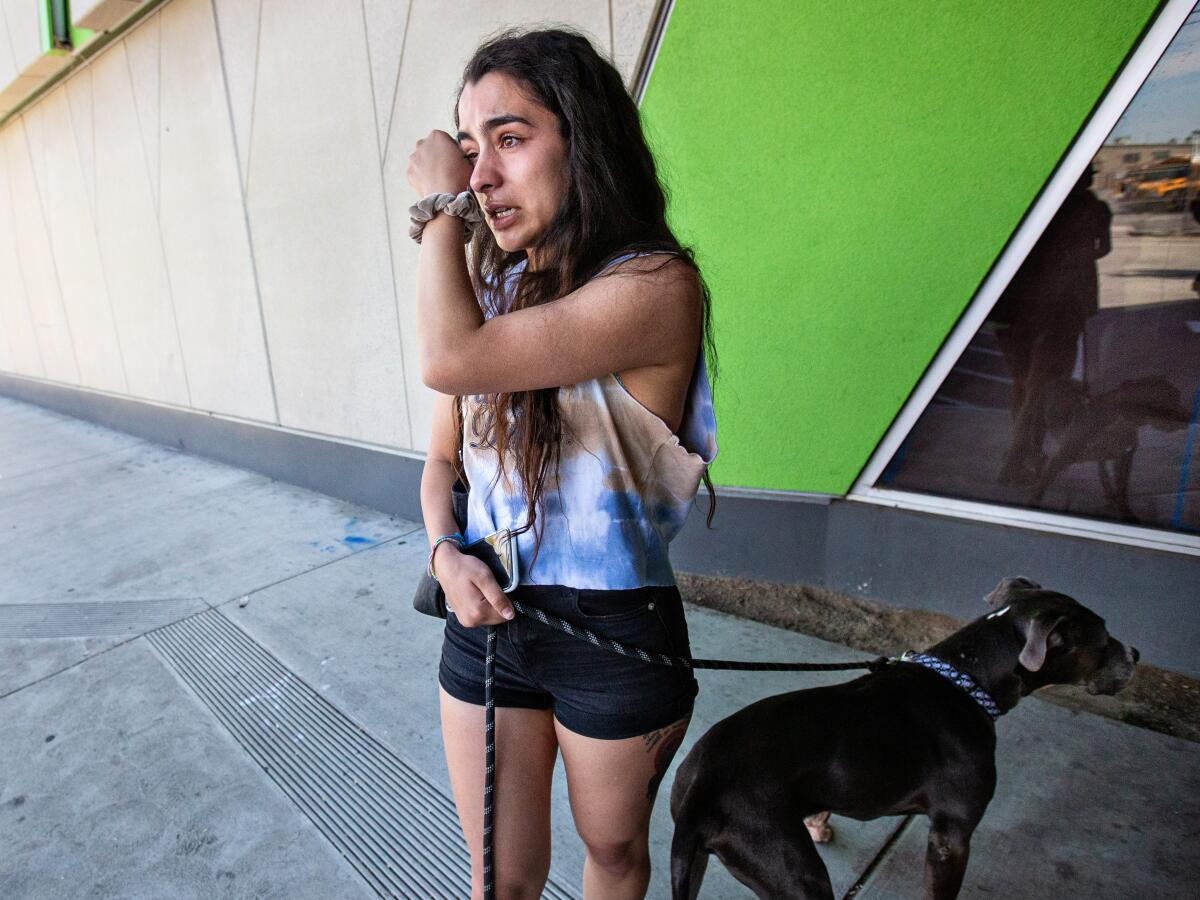
Animal shelters across the county are facing “an immense amount of stress” because of COVID-19, said Matt Bershadker, chief executive of the American Society for the Prevention of Cruelty to Animals.
“Many shelters are facing reduced staff and volunteer support, which is putting animals in desperate need of temporary or permanent sheltering,” Bershadker said.
The city of L.A. has temporarily closed two of its six animal shelters to help protect the health of its staff, while four remaining shelters are operating on an appointment-only basis. None of the Animal Services employees have been diagnosed with COVID-19, Barnette said, but about 80 workers are out because of issues related to the virus or other reasons.
The shelter closures and appointment-only hours at the facilities alarm Lisa Lange, senior vice president at People for the Ethical Treatment of Animals. The city’s shelters “need to be seen as the essential service that they are,” Lange said.
PETA sent a letter last month to Mayor Eric Garcetti saying it had received complaints that the city was turning away animals, including sick and injured ones, at its shelters. In one instance, a staff member at the West L.A. shelter reportedly told a caller that even if an animal looks sick or starving, the facility would take the animal only if “it was an emergency,” according to the letter.
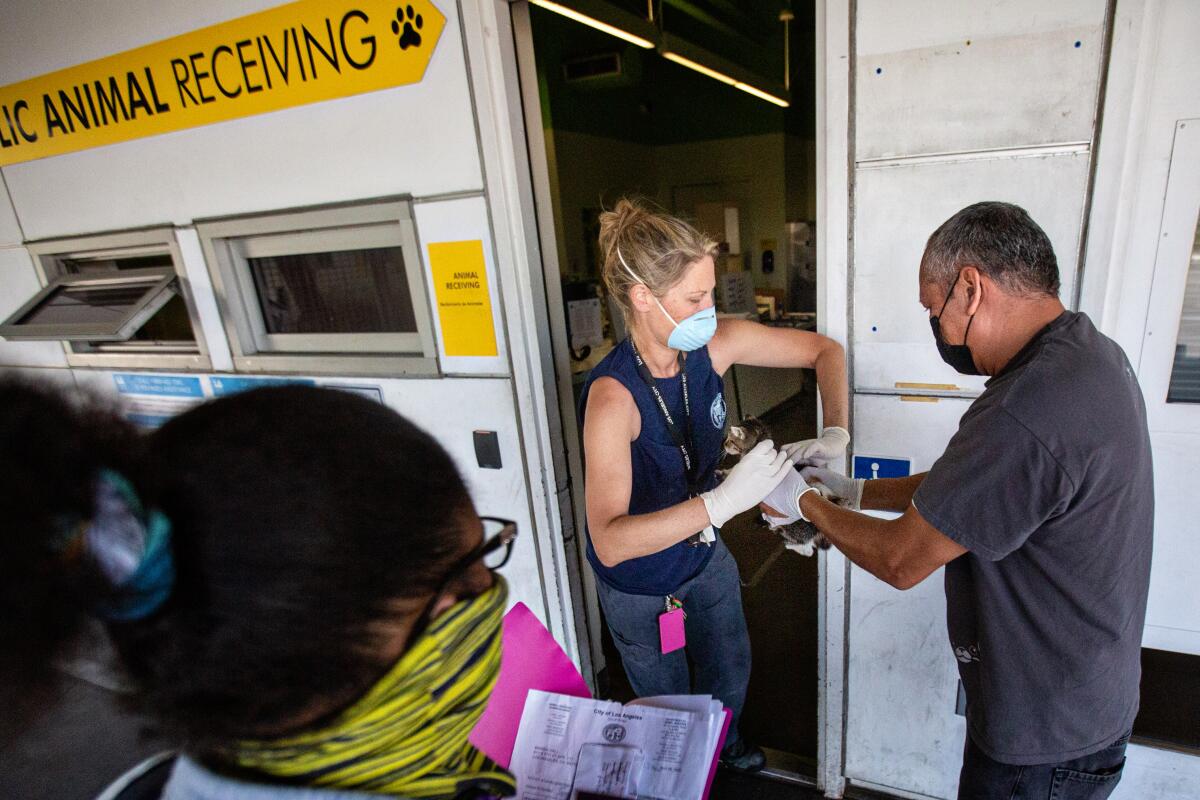
Agnes Sibal-von Debschitz, a spokeswoman for Animal Services, said the allegations in the letter “were so generalized it appeared they had been taken directly off of Facebook. We didn’t have enough detail that we could even investigate.”
Lange also said she’s troubled by Garcetti’s proposed budget cuts to the department’s sterilization program. “That’s our biggest defense against overpopulation,” Lange said. “It’ll cost the city more in the long run and will cost the animals their lives.”
Facing a dramatic loss in revenue, the mayor last month proposed slashing spending at departments and furloughing thousands of workers.
Garcetti’s budget, set to be debated this week by council members, reduces funding for Animal Services to $23 million, down from $27 million this year. The proposed budget allocates $400,000 for animal sterilizations, nearly half of what the department received this fiscal year.
Barnette called the drop in funding for sterilization concerning. The department is also asking that some types of Animal Services workers be exempted from the furloughs.
The city partners with Best Friends Animal Society, a national animal welfare group, on efforts to bring down euthanasia rates at shelters. Best Friends Chief Executive Julie Castle said that investing in sterilization programs and offering pet food to owners are going to be key to saving animals.
She’s also hopeful that the community continues to step up and foster. “It really is about keeping pets in the homes in the first case,” Castle said. “That’s our entire focus right now.”
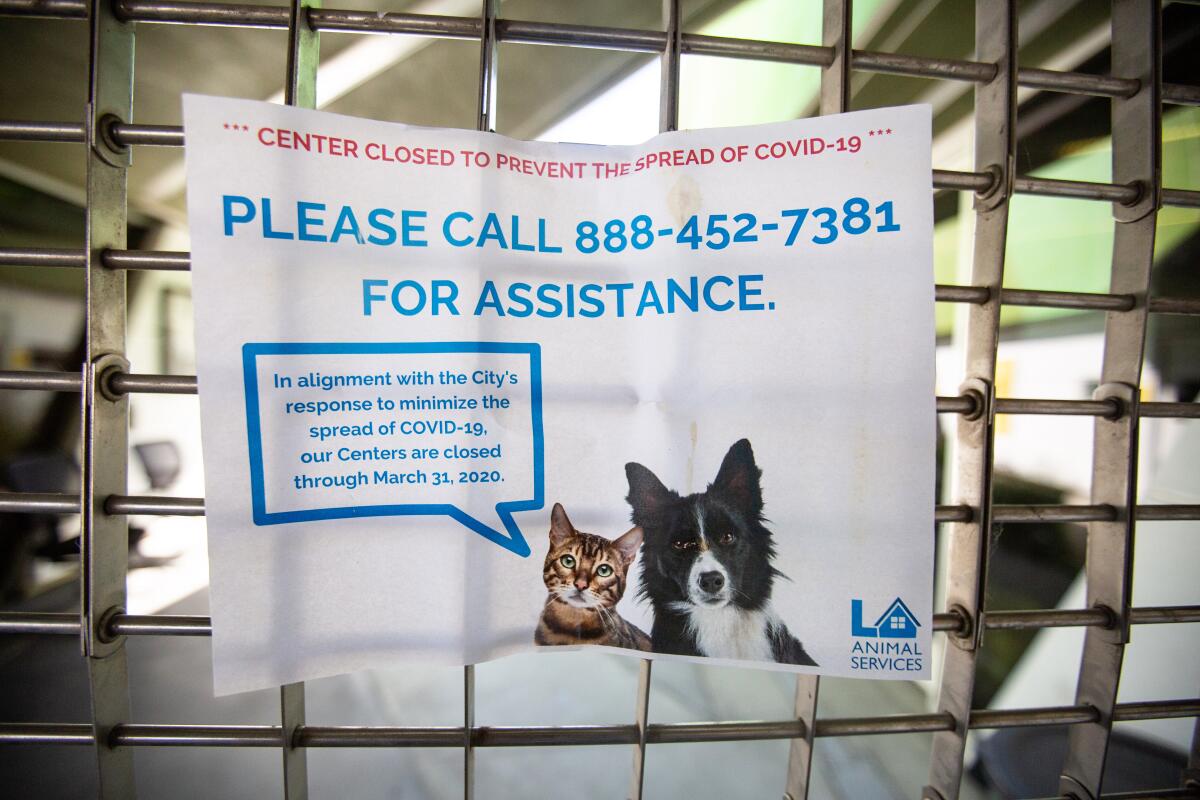
More than 545 dogs have been fostered this year from city shelters, compared with 134 at the same point in 2019, according to the Animal Services Department. At the same time, cat and dog intakes were down 39% at the city’s shelters in March compared with a year ago.
Fullerton resident Christine Gamez fostered Tyson, a pit bull mix, for the last few weeks but was forced to return him to L.A.’s Chesterfield Square shelter after neighbors in her apartment complex complained about his barks and cries.
Gamez, who attends Cal State Fullerton, was tearful as she dropped him off but hopeful that Tyson would soon be fostered again by someone she’d connected with on social media.
Fostering is a way “to get another dog out of the shelter,” Gamez said. “There are probably more dogs being surrendered right now.”
More to Read
Sign up for Essential California
The most important California stories and recommendations in your inbox every morning.
You may occasionally receive promotional content from the Los Angeles Times.











